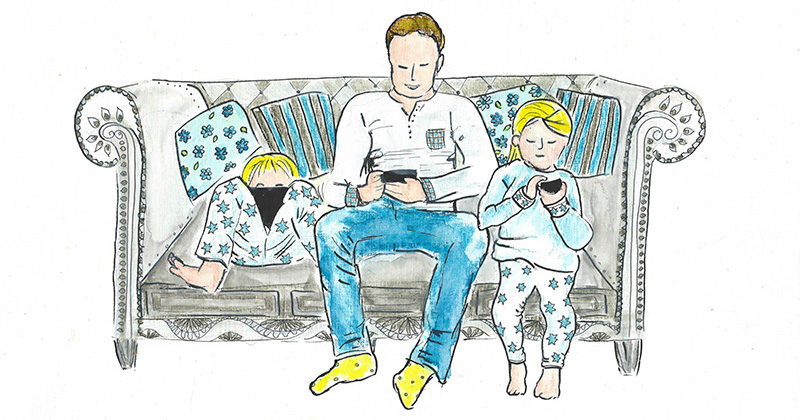How Modern Technology Affects Your Family’s Sleep
Modern Technology: How Is It Affecting Your Family’s Sleep?
We find ourselves submerged in technology. With smartphones, iPads, laptops and so much more, we are kept connected and informed across and around the world. But what cost is this having on our sleep?
Regular use of electronic devices negatively impacts the number of hours of sleep you get and how restorative that sleep is. This can then have an adverse effect on how well you can function the next day.
So what is going on exactly?
The sleepy hormone: Melatonin is known as “the sleepy hormone”: It regulates your sleep-wake cycle. Your body releases it at night, and it then induces sleep. However, melatonin release is affected by the blue light that is emitted from most digital devices (iPads, smartphones, digital TVs, and laptops). Blue is the brightest wavelength. When your brain senses this blue light, it perceives it as sunlight. As a result, it assumes that it’s still daytime and doesn’t let your body release the right amount of melatonin for sleep.
And that’s not all… Electronic devices also cause noise interference. From text messages to Facebook alerts, most people can remember a time when a noise from their phone suddenly woke them up. “Just put it on silent, then,” I can hear you all say. Unfortunately, some studies have found that even when the phone or device is on silent, the electromagnetic signals interfere with sleep quality.
Bedtime should be a relaxing time. Writing work emails or texting friends late at night activates your mind. In addition, watching a scary movie or playing an intense game of Angry Birds on your phone before bed keeps your mind awake and increases cortisol levels. Cortisol stimulates the body. This with the depleted melatonin levels can cause even bigger sleep problems.
It’s tough on kids. The majority of homework today requires computers. Since homework is done after school, children can be stuck sitting in front of the computer for hours on end. School pressures and extracurricular activities can make it difficult to fit homework in at any other time than just before bed.
So how can we improve our sleep?
- Be a good sleep role model. The National Sleep Foundation found that if parents don’t allow an electronic device in their bedroom, then their children are less likely to as well. So be a good role model and get rid of your electronic devices from your bedroom. Not only will you benefit from peace and quiet, but also your body will learn to view your bedroom as a place for rest. Try it for two weeks and see how you feel!
- Read a real book. Creating a habit of reading before bed is an excellent idea and a great part of anyone’s bedtime routine. Instead of using a smartphone or iPad to read, just use a good, old-fashioned book! Children who read from an early age have better literacy rates and emotional intelligence.
- Empower your children. No one likes to be told what to do, especially teenagers! Rather than telling your child to turn off the computer and go to sleep, educate them on how technology affects sleep. Then empower them to make their own decisions. Even get them to read this article!
- Try a different routine. Consider removing an activity from your child’s routine after school. Work with your child to find a way to get homework done earlier, so that they can get a better night’s sleep.
Night mode: If you can’t face removing your smartphone from the bedroom just yet, remember that most smartphones now come with night mode. Turning it on changes your screen to use primarily red light instead of blue light. This makes it dimmer overall and less intense on your eyes.
- Sleep hygiene: No, this doesn’t mean taking a shower before bed! Start creating some simple, good sleep habits. Go to sleep and wake up at the same time every day, avoid sugars and caffeine in the evening and make your bedroom nice and dark for sleep.
By Kate Fergusson
As a certified paediatric sleep consultant and mother, Kate knows only too well that not getting enough sleep affects our state of mind, feelings, relationships and health. She feels strongly that healthy sleep habits make for children who are curious, energetic, happy, playful, and eager to learn. Follow Kate for up-to-date advice and support with your child’s sleep. To find out more about Kate: https://www.simplesleep.co.uk/ https://www.facebook.com/simplesleep.co.uk/ https://www.instagram.com/simplesleep.co.uk/
Illustration by Lemady Rochard
Lemady is an artist and illustrator who also runs Storycraft classes and parties for children at the mal_Raum art studio in Ruschlikon, ZH. She has a background in theatre arts and children’s literature. Lemady lives near Einsiedeln SZ with her family. Contact her: Storycraft.ch@outlook.com Facebook: www.facebook.com/lemadyart




